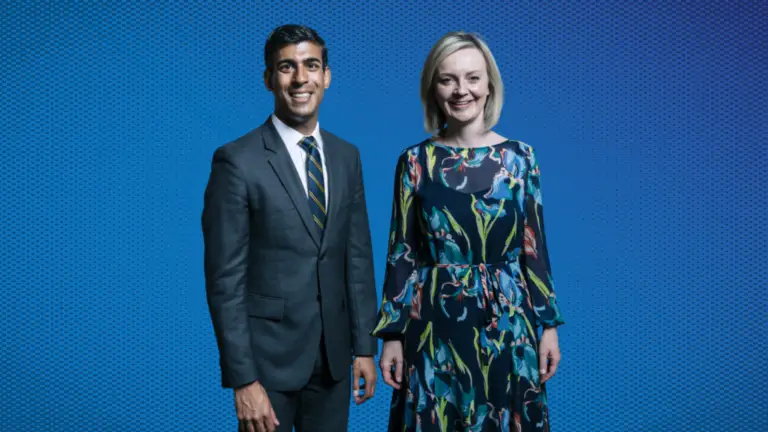Last week PLMR’s Senior Political Counsellor, Leon Emirali, led a focus group comprised of a range of Conservative members from across the country, to gather their views on the two candidates to be next party leader and Prime Minister. Below are some of the group’s key findings.
What attributes do you look for in the next leader?
There was a running theme across this question that long-standing Conservative members have been ‘let down’ by the Johnson Government over questions of trust and integrity. Members said the PM’s behaviour did not align with true Conservative values and had resulted in ‘chaotic’ Government that distracted from many good things being done. There was near-unanimous agreement that the next leader would need to show moral decency, integrity, and professionalism to restore faith in Government, run an efficient operation that can deliver on a return to true Conservative values, and communicate complex policy decisions effectively.
What policy areas are most important to address?
There was broad agreement that addressing the cost-of-living crisis and strengthening the post-Covid economy are the key challenges that members want to see addressed. They agreed that ‘everything else flows from a strong economy,’ and so the issue of money in people’s pockets, and delivering a clear economic plan for the country, are the main pillars of policy that members want to see addressed head on. Once this has been set out, plans to improve things such as the NHS and education can be put in place.
Some cited the need for tax cuts as key to an economic plan to stimulate growth and improve living standards; but others stressed that while tax cuts may be one solution, they are not the be-all and end-all of an economic package and should form part of a wider economic strategy.
Some thought addressing ‘woke culture’ and pushing back on societal trends on free speech is needed. However, this issue was more divisive and discourse around it was described by other members as ‘performative’ and ‘London-centric’ – one said that many people outside London are bemused by the significance lent to issues which don’t affect them.
Rishi Sunak’s strengths and weaknesses
Rishi was described as competent, professional, and capable of bringing stability. Members cited his clear and positive communication style as a big strength. He is seen as respectable and approachable, and his career expertise in finance is viewed as a bonus.
Members mostly agreed that Sunak’s private wealth is not an issue for them, and if anything, something that should be applauded by Conservatives – though they did agree that this would be a key attack line used by Labour. Weaknesses highlighted were his potential difficulty in relating to those suffering from the cost-of-living crisis, and an over-emphasis on presentation – one member described him as seeming ‘like a salesman’.
Liz Truss’ strengths and weaknesses
Truss’ main strength is that she is seen as a candidate of change, providing a new direction with a bolder economic plan, and one with ideological clarity. There was a feeling amongst the group that she is someone who says what she means and will do what she says – a line used by Team Truss to describe their candidate. Being able to deal with high-pressure situations and being combative on the world stage were other pluses. Her role in addressing Russia after the invasion of Ukraine was mentioned.
A recurring weakness brought up here was the difficulty in ascertaining Truss’ political grounding – her having voted for Remain, yet being the candidate of the European Research Group and of the Conservative Right; her previous support for the Lib Dems – these were brought up as examples of ‘chameleon like’ qualities leading to questions over what she really stands for. There were also worries over her ‘awkward’ communication style, and her policies only appealing to a small section of the wider electorate.
In the driving seat
BMWs, Aston Martins, and Porsches all came to mind for members describing Rishi, who saw his closest vehicular likeness as a sleek, well-engineered, high-performance sports car.
Truss was described by one member as a ‘tank’ who could smash through anything to get her objectives. Less excitingly, she was also described as someone who ‘wants to be a Land Rover but may end up being a Vauxhall.’
Taking inspiration
When asked whether the candidates resembled any former party leaders, some members agreed that Rishi Sunak was reminiscent of David Cameron, with an optimistic confident style used to push big tent Conservatism during a precarious economic situation.
Showing the drawbacks in her communication style, Truss was seen to be ‘trying’ to channel Margaret Thatcher, but not very successfully.
Multiple members of the group agreed that such comparisons were neither similar nor helpful, and stressed that they should be viewed as individuals in their own right.
Where are votes going?
For all the discussion about many Tory members submitting ballots as soon as voting begins, much of the group were on the fence. Even those who were leaning towards a particular candidate stressed that they are of an open mind, and willing to hear what the other has to say, showing there is much ground to be gained in the contest to come.
Half of those answering this question said they would have preferred different candidates, and that it is a shame some did not stand, making this a highly unpredictable contest.





